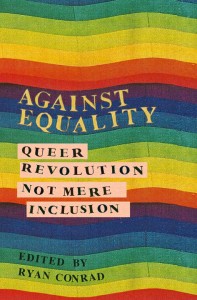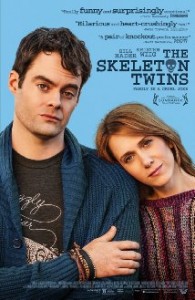 Against Equality: Queer Revolution, Not Mere Inclusion
Against Equality: Queer Revolution, Not Mere Inclusion
Edited by Ryan Conrad
AK Press. 260 pages, $15.
The group Against Equality is a collective of radical queer writers staunchly opposed to the mainstream GLBT movement’s fight for social and political equality, an endeavor they perceive as inherently conservative in its quest for “inclusion in inhumane and elitist institutions.” Combining their three previous anthologies into one convenient book, this new volume is divided into three sections, each one attempting to slaughter a sacred cow in mainstream American gay politics: gay marriage, gays in the military, and gay hate crimes legislation. All of the essays in the new anthology have been published previously by various on-line and print sources, and none have been re-edited. Although the pieces vary in quality, what’s consistent from cover to cover is each writer’s insistence that social and political equality isn’t something GLBT folks should be striving for if equality means partnership in oppressive, discriminatory, and brutal institutions—i.e., the military, the prison system, and the institution of marriage. According to the book’s main introduction, one of the persistent criticisms of the Against Equality collective has been its tendency to disparage without offering alternative solutions. Maybe so, but the book is still an excellent compilation of contemporary radical queer writing in one place. While the militant and at times hyperbolic tone of some of the pieces will be a turnoff for some readers—the book is published by AK Press, one of the world’s largest anarchist publishing houses—for others it will be a refreshing change from the typical GLBT political discourse they’re used to hearing.
Jim Farley
 The Skeleton Twins
The Skeleton Twins
Directed by Craig Johnson
Duplass Brothers Productions
Two alums of Saturday Night Live team up in this comedy-drama about a pair of thirty-something twins, Milo and Maggie Dean—played by Bill Hader and Kristen Wiig—who reunite after ten years of estrangement. Both have “issues,” to say the least—the reunion is prompted by Milo’s suicide attempt—and much of the film is about how the past continues to haunt the present as their earlier life together comes spilling into their current relationships and anxieties. Maggie is married to an adorable lug but can’t resist diddling her scuba instructor (among other acquaintances); but it’s Milo’s story that interests us here. That Milo is gay is not the problem—surely we’re past that heavy motif—but it turns out his first sexual experience was with a high school teacher when the lad was only fifteen. It was a huge deal when it happened—things were settled quietly, we learn—but Milo isn’t completely over the relationship and in fact seeks out the teacher, named Rich, with thoughts of reviving the affair. Thus has the movie entered that radioactive territory of “intergenerational sex,” otherwise known as pederasty. What’s surprising is that the film doesn’t indulge in the usual hand-wringing over Rich’s turpitude or dwell on how Milo was traumatized for life by the affair. In fact, Milo wasn’t traumatized at all and insists that it was not only consensual but a positive experience in his early gay life. This seems to me a remarkable position for a film to adopt in these times, when it’s automatically assumed that the younger party is a victim of abuse and ipso facto harmed by the experience. I’m surprised it didn’t trigger more controversy than it did, including threats of a boycott. For whatever reason, mainstream reviewers were more worried about whether the movie is a really a comedy or a drama. Go figure!
Wendy Fenwick





